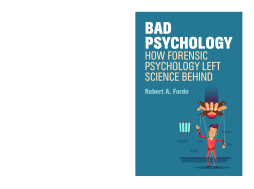
Additional Information
Book Details
Abstract
For decades the psychological assessment and treatment of offenders has run on invalid and untested programmes. Robert A. Forde exposes the current ineffectiveness of forensic psychology that has for too long been maintained by individual and commercial vested interests, resulting in dangerous prisoners being released on parole, and low risk prisoners being denied it, wasting enormous amounts of public money. Challenging entrenched ideas about the field of psychology as a whole, and how it should be practised in the criminal justice system, the author shows how effective changes can be made for more just decisions, and the better rehabilitation of offenders into society, while significantly reducing the cost to the taxpayer.
This is a fearless account calling for a return to scientific evidence in the troubled field of forensic psychology.
Robert A. Forde is a retired consultant forensic psychologist and prison psychologist. He lives in Wiltshire, UK.
Bad Psychology is a must and timely book for anyone interested in forensic evaluation and the (mis)-use of science. It is a wake-up call to bring science to the work of forensic examiners.
Dr. Itiel Dror, Cognitive Neuroscientist, University College London
A riveting, sharply written examination of the fault line between good science and forensic folklore.
E.J. Wagner-author of the Edgar-winning The Science of Sherlock Holmes: From Baskerville Hall to the Valley of Fear, the Real Forensics Behind the Great Detective’s Greatest Cases
Table of Contents
| Section Title | Page | Action | Price |
|---|---|---|---|
| Bad Psychology – How Forensic Psychology Left Science Behind by Robert A. Forde | 1 | ||
| Acknowledgements | 5 | ||
| 1. Who does he think he is? | 9 | ||
| 2. How Psychologists Work | 16 | ||
| 3. Treatment Needs Assessment – Who Needs It? | 30 | ||
| 4. Risk Assessment – Coffee Cans and Crystal Balls | 48 | ||
| 5. Formulation – When ‘I Don’t Know’ Is the Correct Answer, All Other Answers Are Wrong | 71 | ||
| 6. Intervention – A Suitable Case for Treatment? | 95 | ||
| 7. Evaluation – What Works and How Would We Know? | 123 | ||
| 8. Communication – Who’s Listening? | 168 | ||
| 9. The Parole Process – Who Goes Home? | 183 | ||
| 10. Heuristics and Biases – How Can We Be So Stupid? | 201 | ||
| 11. Are We Hardwired for Poor Judgement? | 224 | ||
| 12. The Future of Forensic (and Maybe Other) Psychology | 232 | ||
| 13. Leaving the Science Behind | 263 | ||
| Postscript | 269 | ||
| References | 274 | ||
| Subject Index | 291 | ||
| Author Index | 297 |
